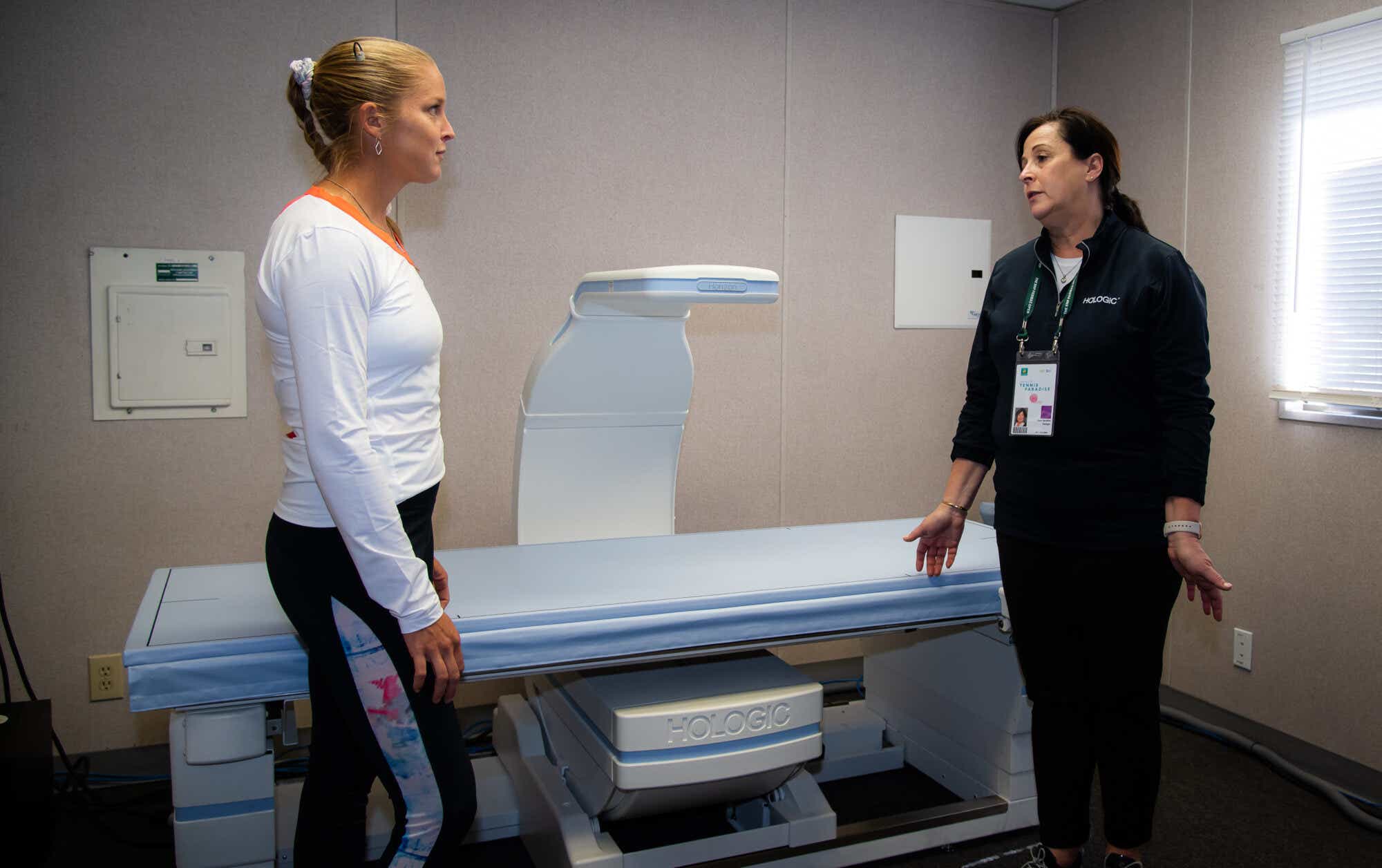Being an elite athlete is a lot of hard work, physically and mentally. From Simone Biles to Gracie Gold, scores of well-known female athletes have spoken out about the anxiety that comes with being an ultra-visible player in a sport where loss or victory falls solely on you. Couple that with the culture of “pushing through pain” and the ever-present possibility that an injury could take you out of the game forever, and you’ve got a recipe for potential disaster.
For the Women’s Tennis Association (WTA), it’s imperative that their athletes stay in peak physical shape — but they also aim to empower players to speak out about the immense pressure that comes with competing in a high-stakes sport, and to seek help if needed. We know now that there’s a healthcare inequality gap between men and women, and that’s just the kind of injustice the WTA was founded to eliminate. When tennis legend Billie Jean King started the WTA in 1973, she was determined to fight for women both on and off the court. According to Micky Lawler, the organization’s current president, that dedication to women’s equality has only expanded with time. “The WTA was founded on equality, and that’s not just pay equality — but health equality,” she says. “It’s about giving women the opportunity to be the best, and to empower them.”
Though it may seem pretty surprising in 2022, that was actually the thinking behind Virginia Slims becoming the WTA’s first major sponsor in the 1970s. According to Lawler, “Since 1973, we’ve learned a lot about how addictive and lethal cigarettes are. But back then, Virginia Slims was an empowering brand. Their slogan was, ‘You’ve come a long way, baby.’ The women of the WTA had come a long way, and they were going to go even further.”
Women’s empowerment and their access to quality healthcare, especially preventive care, are inextricably intertwined. For example, according to the Hologic Global Women’s Health Index, only one in nine women globally reported being tested for STIs in the past year, and in some cases, women reported that having an STI led to their being “blamed for transmitting the illness and infertility resulting from it, [or resulted in] violence, abandonment, or divorce.”
Statistics like these are part of what has made the WTA seek out partners who embody this empowerment — especially health empowerment — for women. That truth took center court in March, when medical technology innovator — and women’s health champion — Hologic became the largest global sponsor in WTA history. Through the Hologic WTA Tour, Hologic and the WTA have increased support for players’ preventive care. This includes annual physicals which cover everything from STI to blood pressure testing, and even access to DXA scans, which measure bone density and provide body-composition analysis. These additions to the WTA’s previous health offerings could be instrumental in helping athletes stay in peak competition shape.

For over 20 years, the WTA has also offered mental health services for players; and that access has become even more integral in recent years. “In individual sports like tennis, the mental pressure on these athletes is profound,” says WTA sports medicine expert Dr. Jennifer Maynard. “The WTA’s mental health and wellness team is amazing: We have three full-time mental healthcare providers on staff, and many travel to tournaments and are available 24/7. We take this issue very seriously, both for athletes struggling with anxiety and depression, but also for those really feeling the weight of performance pressure.”
Hologic and the WTA not only encourage players to prioritize their physical and mental health, but also to use their platforms to inspire other women to take their health seriously. Lawler explains, “Our organization puts these players in a position to be role models for other women. So many young women think they’re immortal. We want our younger athletes to show girls that it’s necessary to get yearly physicals and regular testing for sexually transmitted infections.”
It’s not only current players who are speaking up about the importance of maintaining both mental and physical health: The WTA’s retired tennis legends are just as vocal as the current stars when it comes to sharing the importance of preventive care through routine mammograms, cervical cancer screening, bone-density testing, mental health maintenance and more.
One such legend who embodies the WTA’s emphasis on health is Chris Evert, who won a whopping 18 major singles titles between 1974 and 1986. Lawler remembers the moment last year when Evert shared some devastating news: She had tested positive for the BRCA gene, and had decided to have a preventative hysterectomy. “I asked her if she was sure,” Lawler recalls, “and she said, ‘Yes, absolutely. My sister Jeanne died way too young from ovarian cancer because it was discovered too late. I've seen her kids have to deal with the loss of their mom — I don't want to take that chance.’” Following the procedure, Evert faced the exact trial she'd been trying to avoid: She was diagnosed with stage 1C ovarian cancer. Evert recently completed chemotherapy treatment, and according to Lawler, has now taken on the mission of spreading awareness about ovarian cancer — she recently appeared in an episode of HBO’s Real Sports with Bryant Gumbel to discuss her experience. Evert told Lawler, “If I hadn’t been tested for that gene, it may have been too late for me. My sister’s death saved my life.’”
Athletes’ bodies are their instruments, so it’s incredibly important that they — like all women — have access to life-saving preventive care. In a sport that's so mentally and physically grueling, some women might be inclined to put their health — particularly routine screenings or mental health treatments — on the back burner. For any woman juggling a busy life, putting off doctors appointments and screenings might not seem like a big deal. But as Lawler explains, “These athletes are constantly practicing, traveling, and competing, but we make sure they never miss a screening. So if they can do it, you can do it.”









